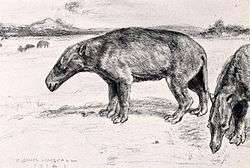Sphenocoelus
| Sphenocoelus Temporal range: Late Eocene | |
|---|---|
 | |
| Restoration of S. intermedius | |
| Scientific classification | |
| Kingdom: | Animalia |
| Phylum: | Chordata |
| Class: | Mammalia |
| Order: | Perissodactyla |
| Family: | Brontotheriidae |
| Genus: | Sphenocoelus |
| Species | |
|
See text | |
Sphenocoelus is an extinct genus of brontothere of the subfamily Dolichorhininae, family Brontotheriidae endemic to North America during the Middle Eocene epoch (46.2—42 mya), existing for approximately 4.2 million years.[1]
Taxonomy
Sphenocoelus was named by Osborn (1895). It is not extant. Its type is Sphenocoelus uintensis. It was assigned to Brontotheriidae by Osborn (1895) and Carroll (1988); and to Dolichorhininae by Mader (1998).[2][3]
Morphology
In life, it would have resembled a hornless rhinoceros, to which it was distantly related. However, it was smaller than modern rhinos, standing about 1.2 metres (3.9 ft) high at the shoulders, and had a much longer head. Its teeth were adapted to eating soft vegetation, such as forest leaves. Like other brontotheres, it had four toes on the front feet, and three on the hind feet, and the animal is unlikely to have been able to run fast.[4]
A single specimen was examined by M. Mendoza for body mass and was estimated to have a weight of 106.2 kg (234 lbs).[5]
Fossil distribution
Fossils were restricted to southern Wyoming and eastern Utah.
Species
S. blairi, S. bridgeri, S. harundivoras, S. hyognathus (syn. Dolichorhinus longiceps, Telmatotherium cornutum), S. intermedius (syn. Dolichorhinus fluminalis, Dolichorhinus heterodon, Mesatirhinus superior), S. uintensis.
References
- ↑ PaleoBiology Database: Sphenocoelus, basic info
- ↑ R. L. Carroll. 1988. Vertebrate Paleontology and Evolution. W. H. Freeman and Company, New York 1-698
- ↑ B. J. Mader. 1998. Brontotheriidae. In C. M. Janis, K. M. Scott, and L. L. Jacobs (eds.), Evolution of Tertiary Mammals of North America
- ↑ Palmer, D., ed. (1999). The Marshall Illustrated Encyclopedia of Dinosaurs and Prehistoric Animals. London: Marshall Editions. p. XXX. ISBN 1-84028-152-9.
- ↑ M. Mendoza, C. M. Janis, and P. Palmqvist. 2006. Estimating the body mass of extinct ungulates: a study on the use of multiple regression. Journal of Zoology
